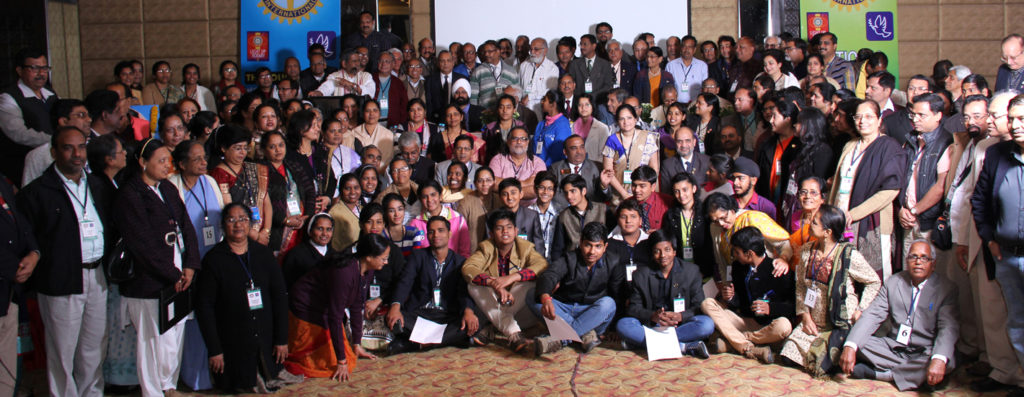
NATIONAL PEACE CONVENTION, INDORE
Indore Peace Declaration 2015
We, the 280 participants of National Peace Convention, held from January 30 to February 01, 2015 at Radisson Blu hotel Indore, M.P. are convinced that we have an urgent mission of peace building by becoming inspiring sources of peace. We, the participants from 12 states of India, are grateful to the Committee for Peace and Conflict Prevention/Resolution, Rotary Internal District-3040 for organizing this convention and providing us a unique experience under the leadership of Rtn. Narendra Jain Dist. Governor and Rtn. Varghese Alengadan, chairman, organising committee.
During the three days we listened to the views and experiences of illustrious persons from various fields like Sri Thushar Gandhi, Sri Eduardo Faleiro, Ms. Medha Patkar, Rtn. Ashok Mahajan, Dr. Jill Carr-Harris, Ms. Anuradha Shankar IPS, Dr. D P Singh, Sri. Shravan Garg, Sri. Chinmay Mishra, Dr. N. P. Jain IFS, Dr. Narendra Virmani IPS, Brigadier Dr. V.D. Abraham, Rtn. Vijay Narayan Mittal, Dr. Sudhir Shidhyae, Dr. Gurmeet Singh Narang, Dr. Joseph Mattam, Dr. Janak Palta McGilligan, Prof. A A Abbassi, Swami Parbudhananda Sarawati Giri, Sri BJ Heerjee IAS, and Jacob Peenikaparambil.
We listened, reflected and discussed in groups on peace from various perspectives:
- Human development and promotion of peace
- South Asia Union to promote peace and prosperity
- Preserving the national heritage of pluralism for lasting peace and integral development of India
- Relevance of Mahatma Gandhi in promoting peace and conflict resolution
- Economic empowerment of the poor, a prerequisite for promotion of peace and conflict resolution
- Role of spirituality, the source of peace from the sacred scriptures from the perspective of Hinduism, Islam, Christianity, Sikhism, Jainism, Bhuddhism, Bahai Faith and Zoroastrianism
- Role of Media in promoting peace and prosperity
- Causes and solutions of militancy
- Prevention of crimes against women and children
- Urgency of peace education in schools and colleges. As a result of the process of listening, reflecting, discussing and exchanging views our knowledge of peace deepened; the horizon of our thinking expanded; our vision broadened; deeper convictions emerged in us; and we have resolved to:
-
Transform each one of us a fountain of peace through mutual respect and appreciation of diversity, which is our heritage and strength
-
Give priority to spirituality and human values, which is the core of all religions and practice and promote pluralistic heritage.
-
Promote the values enshrined in the Indian constitution, especially Justice, equity, freedom and brotherhood in our behaviour and attitudes to people and issues.
-
Contribute to sustainable development by using the resources responsibly.
-
Acknowledge the resources and contribution of women in the development of society and promote and protect their rights.
-
Spread the message of peace in our public functions, on the occasion of sports and games, decorating the walls of our institutions and worship centres with inspiriting quotations and writing articles, poems and songs on peace and publishing them.
-
Launch a National Peace Movement as a
follow up
of the convention. The movement will network with the existing
organizations
which promote peace. The movement will take up activities at the national, regional and local levels to promote peace and harmony. The following will be some of the activities.
- Organize National / International Peace Convention every year starting on 30th January, the death anniversary of Mahatma Gandhi and ending on February 01.
- Organize peace conventions at the regional and local levels.
- Motivate educational institutions to organize workshops and seminars on peace building
- Promote meditation as means for creating peace within Individuals and families
- Launch a campaign against giving destructive toys and artificial weapons to the children.
- Organize peace rallies for preventing and resolving conflicts
- Play mediatory role in conflict situations
8 To recommend to the central and state governments
- Form a separate ministry/department for peace and Conflict Prevention
- Play a proactive role in developing SAARC on the pattern of European Union by expanding trade, people to people exchange and making communication cheap.
- Make Peace Education a part of the Syllabus of all teachers’ training institutes and schools. Life stories of persons contributed to peace building shall be part of value education.
- Celebrate peace day on 30th January and honour persons who have dedicated themselves for building peace.
- Provide guidelines to the media with regard to reporting on communal riots.
- Form peace committees at the district and block levels to bring conflicting groups for dialogue
-
To recommend to the universities to start Department of Peace and Conflict Prevention / Resolution and encourage students to do research in this subject.
As tribute to the Father of the nation, Mahatama Gandhi and many other peace builders we, the participants of the National Peace convention, commit ourselves to implement these resolutions. – Participants of National Peace convention 2015, Indore (M.P.)